 January 2016 in “Elsevier eBooks”
January 2016 in “Elsevier eBooks” Trichoscopy is a key method for dermatologists to quickly and effectively diagnose hair and scalp conditions.
 February 2015 in “Current problems in dermatology”
February 2015 in “Current problems in dermatology” The document provides a comprehensive guide for dermatologists to diagnose and treat hair loss.
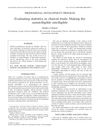 October 2008 in “Australasian Journal of Dermatology”
October 2008 in “Australasian Journal of Dermatology” Medical practitioners need to understand basic statistics to properly evaluate clinical trials and avoid unethical designs.
 57 citations,
October 2021 in “Journal of ethnopharmacology”
57 citations,
October 2021 in “Journal of ethnopharmacology” Indian herbal medicine shows promise for treating skin diseases but needs more research to prove effectiveness.
 24 citations,
November 2019 in “Dermatologic Surgery”
24 citations,
November 2019 in “Dermatologic Surgery” Platelet-rich plasma is most effective for hair loss treatment and wound healing in skin surgery, but more research is needed for consistent results.
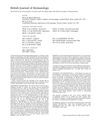 18 citations,
November 2000 in “British Journal of Dermatology”
18 citations,
November 2000 in “British Journal of Dermatology” Many skin patients have mental health issues, so dermatologists should consider psychological care.
 3 citations,
March 2021 in “Journal of the European Academy of Dermatology and Venereology”
3 citations,
March 2021 in “Journal of the European Academy of Dermatology and Venereology” The letter is skeptical about the effectiveness of anti-androgen therapy for COVID-19 and calls for strong evidence from clinical trials.
 November 2023 in “Frontiers in Neuroendocrinology”
November 2023 in “Frontiers in Neuroendocrinology” Some people experience lasting sexual, psychological, and sleep problems after using finasteride or SSRI antidepressants, possibly due to similar underlying causes.

The document is a detailed guide on skin conditions and treatments for dermatologists.
 July 2018 in “British Journal of Dermatology”
July 2018 in “British Journal of Dermatology” Mindfulness reduces anxiety and depression in skin disease patients; dermatologists and psychiatrists often lack confidence in treating psychodermatological conditions.
 151 citations,
August 2010 in “British Journal of Dermatology”
151 citations,
August 2010 in “British Journal of Dermatology” Guidelines for diagnosing common hair loss include detailed history, clinical examination, and various diagnostic techniques.
 22 citations,
January 2013 in “Journal of The American Academy of Dermatology”
22 citations,
January 2013 in “Journal of The American Academy of Dermatology” Birth control pills can help manage acne, but dermatologists should know their skin-related side effects, especially when prescribing drugs that can harm unborn babies.
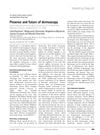 11 citations,
December 2006 in “Expert Review of Dermatology”
11 citations,
December 2006 in “Expert Review of Dermatology” Dermoscopy is becoming essential for diagnosing skin conditions and is expected to be a standard tool for dermatologists.
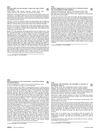 August 2018 in “Journal of The American Academy of Dermatology”
August 2018 in “Journal of The American Academy of Dermatology” Regular follow-up visits, especially with dermatologists, can lower death rates for melanoma patients, with socioeconomic factors also affecting outcomes.
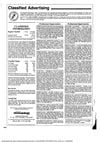 March 1991 in “Archives of Dermatology”
March 1991 in “Archives of Dermatology” Classified ads in the Archives of Dermatology offer job listings and opportunities for dermatologists.
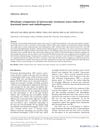 27 citations,
August 2014 in “Journal of Cosmetic and Laser Therapy”
27 citations,
August 2014 in “Journal of Cosmetic and Laser Therapy” Different lasers and radiofrequency affect skin differently, important for dermatologists to choose the right treatment.
 21 citations,
March 2019 in “Journal of The American Academy of Dermatology”
21 citations,
March 2019 in “Journal of The American Academy of Dermatology” The review highlights the need for more research on transgender dermatology, the role of dermatologists in gender affirmation, and the effects of hormone therapy on skin and hair.
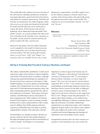 6 citations,
February 2015 in “Dermatologic Surgery”
6 citations,
February 2015 in “Dermatologic Surgery” The document concludes that a new training model could improve dermatology residents' skills in nail procedures and lead to more nail cases being treated by dermatologists.
 4 citations,
April 2022 in “Dermatologic Therapy”
4 citations,
April 2022 in “Dermatologic Therapy” Injecting scalp tissue micrografts is a safe and effective treatment for hair loss after COVID-19.
 3 citations,
January 2010 in “Actas Dermo-Sifiliográficas”
3 citations,
January 2010 in “Actas Dermo-Sifiliográficas” Psychotropic drugs can help treat skin conditions affected by mental health, but dermatologists must use them carefully due to side effects and patient concerns.
 November 2024 in “SKIN The Journal of Cutaneous Medicine”
November 2024 in “SKIN The Journal of Cutaneous Medicine” Visual signs are crucial for accurately diagnosing and treating different types of hair loss in Black patients.
 July 2021 in “Journal of dermatology research and therapy”
July 2021 in “Journal of dermatology research and therapy” COVID-19 may worsen hair loss, and Nourkrin® could be a safe treatment option, but more research is needed.
 47 citations,
February 2019 in “Journal of The American Academy of Dermatology”
47 citations,
February 2019 in “Journal of The American Academy of Dermatology” LGBT individuals have unique skin health needs, including higher STD risks and side effects from gender-affirming treatments, requiring dermatologists to offer knowledgeable and culturally competent care.
27 citations,
January 2015 in “International Journal of Trichology” The supplement helps improve hair growth and reduce hair shedding.
6 citations,
June 2021 in “EClinicalMedicine” ALRV5XR significantly improves hair density in women with hair loss and is well-tolerated.
 4 citations,
July 2021 in “Dermatology and therapy”
4 citations,
July 2021 in “Dermatology and therapy” Hormone therapy increases facial and body hair in transgender men, while hair removal improves well-being in transgender women, but cost is a barrier as insurance often doesn't cover it. Dermatologists can use various treatments for these hair issues.
 2 citations,
July 2023 in “Journal of cosmetic dermatology”
2 citations,
July 2023 in “Journal of cosmetic dermatology” JAK inhibitors are more effective and safer for treating alopecia areata than dupilumab and apremilast.
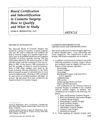 1 citations,
December 1989 in “The Journal of Dermatologic Surgery and Oncology”
1 citations,
December 1989 in “The Journal of Dermatologic Surgery and Oncology” To get certified in cosmetic surgery, doctors must pass exams and have specific experience; dermatologists are encouraged to get certified.
 July 2024 in “Skin Appendage Disorders”
July 2024 in “Skin Appendage Disorders” The supplement significantly improves hair density and appearance in people with hair loss.
 February 2024 in “Journal of Cosmetic Dermatology”
February 2024 in “Journal of Cosmetic Dermatology” Using a laser with bimatoprost solution works better for hair regrowth in alopecia areata than bimatoprost alone.




























